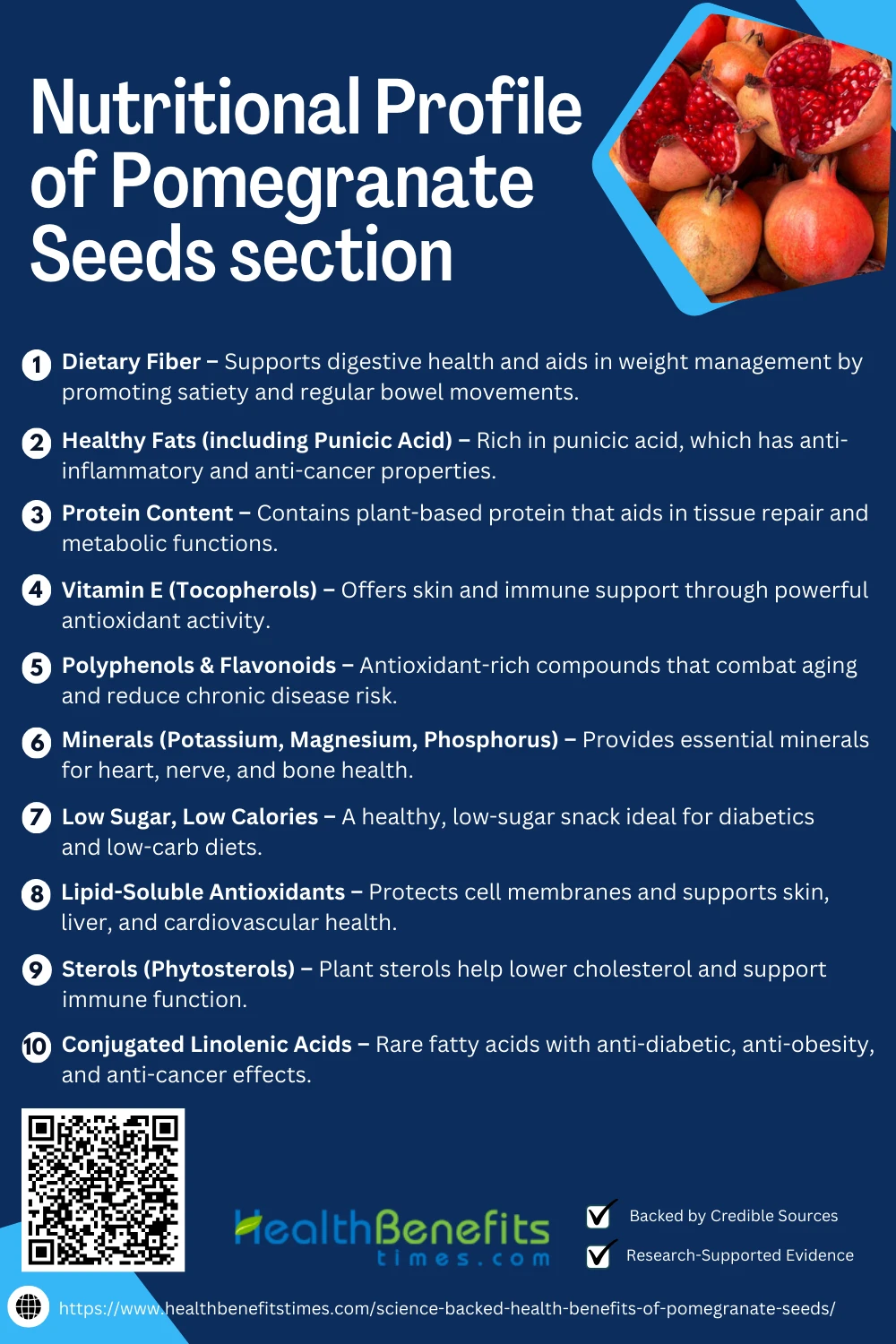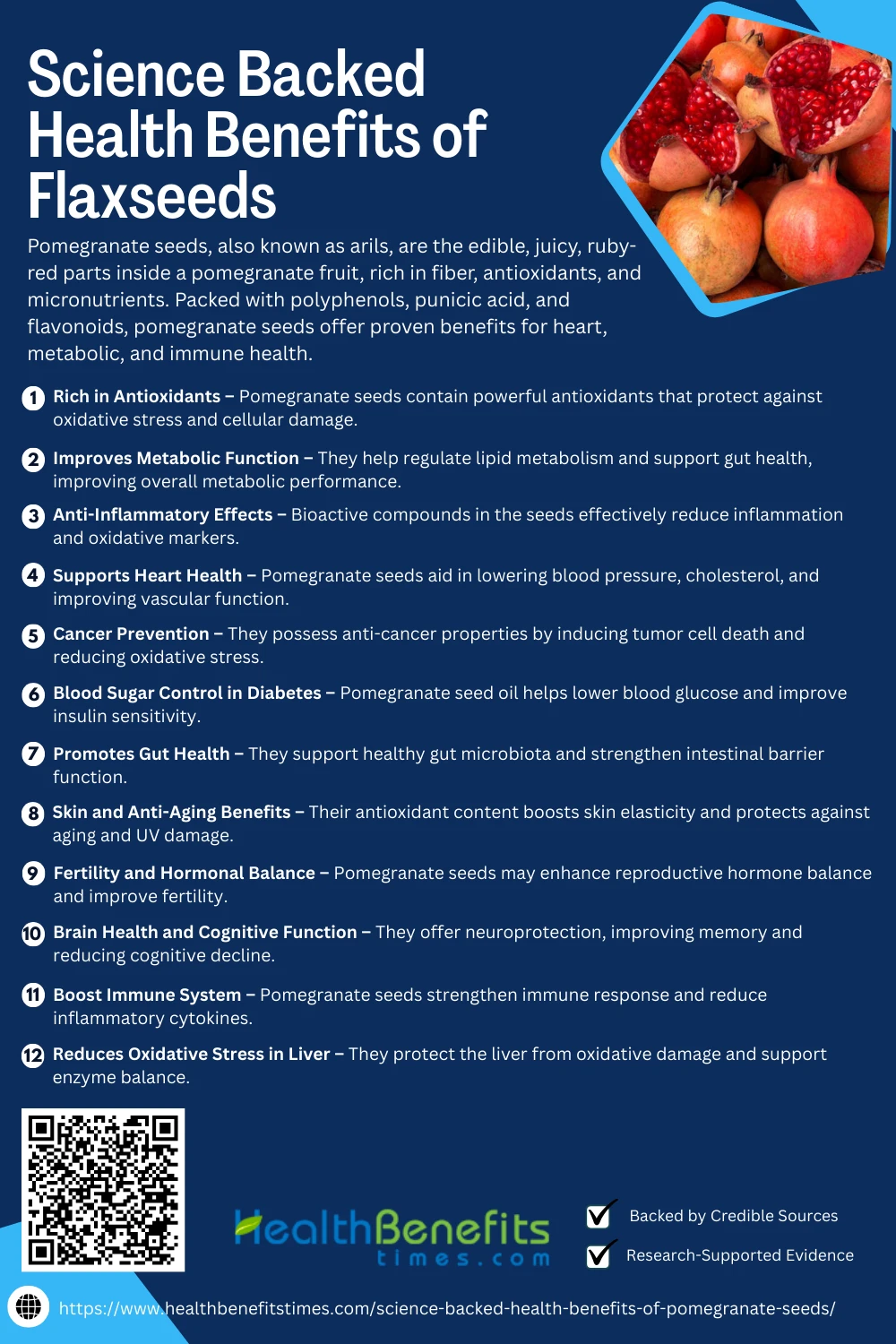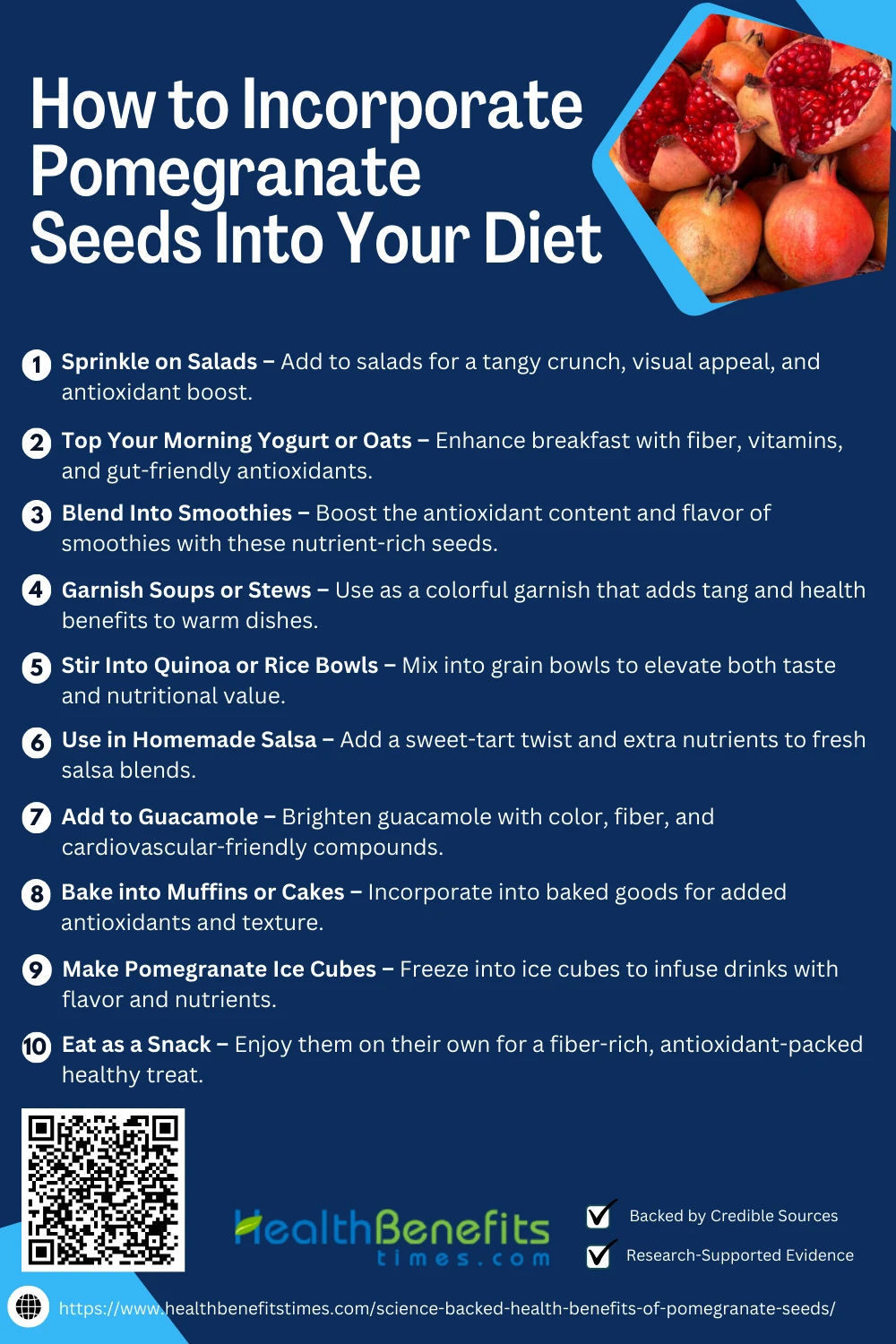- Pomegranate seeds, also known as arils, are the edible, juicy, ruby-red parts inside a pomegranate fruit, rich in fiber, antioxidants, and micronutrients.
- Packed with polyphenols, punicic acid, and flavonoids, pomegranate seeds offer proven benefits for heart, metabolic, and immune health.
- Modern scientific studies support their role in disease prevention, including anti-inflammatory, anti-aging, and anticancer effects.
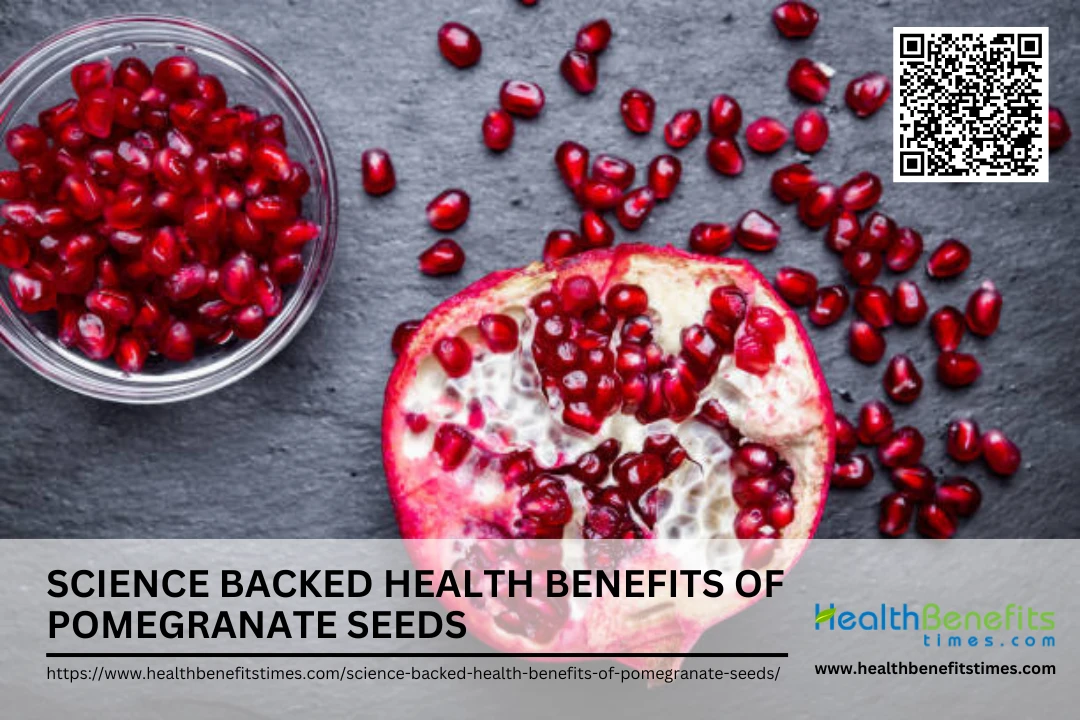 Pomegranate (Punica granatum) is a nutrient-dense fruit native to the Middle East and parts of Asia, celebrated for its vibrant arils and long-standing use in traditional medicine due to its rich antioxidant content. Recent research has shown that the tiny seeds within the pomegranate—often overlooked—harbor potent bioactive compounds that contribute to a range of scientifically validated health benefits. These seeds are a source of punicic acid, flavonoids, and polyphenols, which exhibit powerful antioxidant, anti-inflammatory, and cardioprotective effects. From improving cardiovascular function to supporting metabolic health and even demonstrating anticancer activity in lab studies, pomegranate seeds are gaining recognition as a superfood with significant clinical promise. For instance, studies highlight how pomegranate seed oil encapsulated in food products maintains its bioactivity and supports functional food applications.
Pomegranate (Punica granatum) is a nutrient-dense fruit native to the Middle East and parts of Asia, celebrated for its vibrant arils and long-standing use in traditional medicine due to its rich antioxidant content. Recent research has shown that the tiny seeds within the pomegranate—often overlooked—harbor potent bioactive compounds that contribute to a range of scientifically validated health benefits. These seeds are a source of punicic acid, flavonoids, and polyphenols, which exhibit powerful antioxidant, anti-inflammatory, and cardioprotective effects. From improving cardiovascular function to supporting metabolic health and even demonstrating anticancer activity in lab studies, pomegranate seeds are gaining recognition as a superfood with significant clinical promise. For instance, studies highlight how pomegranate seed oil encapsulated in food products maintains its bioactivity and supports functional food applications.
What is pomegranate seeds?
Pomegranate seeds, also known as arils, are the jewel-like edible structures found inside the pomegranate fruit (Punica granatum), a plant native to the Middle East and South Asia. These seeds are packed with nutrients, including fiber, antioxidants, and polyphenols, making them highly valued both as a food and a medicinal substance in ancient cultures Review of pharmacological and medicinal uses of Punica granatum – Cureus, 2024. (1) Historically, pomegranate seeds were used in Ayurvedic and Unani medicine to treat ailments ranging from digestive disorders to inflammation.
In recent years, pomegranate seeds have garnered increasing scientific interest due to their potent bioactive compounds such as punicalagins and ellagic acid. Studies highlight their antioxidant, anti-inflammatory, and cardioprotective properties, supporting their potential use in preventing chronic diseases like heart disease and certain cancers Frontiers in Nutrition, 2025. (2) Research also suggests that pomegranate juice and extracts may play a role in enhancing immunity and reducing oxidative stress, further solidifying their place as a functional food ResearchGate: Antiviral Nutraceuticals from Pomegranate Juice. (3)
Nutritional Profile of Pomegranate Seeds
Pomegranate seeds are packed with essential nutrients, including fiber, vitamins C and K, folate, and powerful antioxidants like punicalagin and anthocyanins, making them a highly nutritious addition to your diet.
Pomegranate seeds are naturally high in insoluble dietary fiber, which plays a vital role in digestive health. This fiber helps to bulk up stool, support bowel regularity, and prevent constipation. It also contributes to satiety, making it a useful component in weight management strategies. According to a comprehensive review on the medicinal uses of Punica granatum, the seeds’ fibrous structure aids gastrointestinal well-being and metabolic balance.
2. Healthy Fats (including Punicic Acid)
Pomegranate seed oil is especially rich in punicic acid, a unique omega-5 conjugated fatty acid. Punicic acid exhibits strong anti-inflammatory, anti-cancer, and lipid-lowering effects. It is one of the rarest fatty acids found in nature and is the major component in pomegranate seed lipids. Research shows that punicic acid may inhibit tumor growth and reduce markers of inflammation in chronic diseases.
3. Protein Content
Though not extremely high, pomegranate seeds do contain a measurable amount of plant-based protein, making them a useful addition to vegan or vegetarian diets. Proteins from pomegranate seeds are known to contribute to tissue repair, hormone synthesis, and enzyme functions in the body. Their protein quality, when combined with other plant proteins, helps in achieving a balanced amino acid profile.
4. Vitamin E (Tocopherols)
Vitamin E, particularly gamma- and alpha-tocopherol, is abundant in pomegranate seed oil. These compounds are potent antioxidants that help protect cells from oxidative damage and support skin health. Studies have demonstrated that vitamin E in pomegranate seeds promotes skin hydration, reduces inflammation, and supports immune function.
5. Polyphenols & Flavonoids
Pomegranate seeds contain a rich mix of polyphenols and flavonoids, such as ellagic acid and anthocyanins. These compounds are known for their antioxidant effects, which help combat free radicals and reduce oxidative stress—major contributors to aging and chronic diseases. Research has linked these bioactives to reduced risk of heart disease, cancer, and neurodegeneration.
6. Minerals (Potassium, Magnesium, Phosphorus)
Pomegranate seeds are a modest source of essential minerals, including potassium, magnesium, and phosphorus. These minerals support electrolyte balance, nerve conduction, bone density, and energy metabolism. Potassium in particular is important for heart health and blood pressure regulation, while magnesium is involved in over 300 biochemical reactions in the body.
7. Low Sugar, Low Calories
Unlike the fruit’s juice, pomegranate seeds are low in natural sugars and calories. This makes them an ideal snack for those watching their sugar intake, such as individuals with diabetes or those on low-carb diets. The seeds offer crunch and flavor without the spike in blood glucose often associated with fruit juices.
8. Lipid-Soluble Antioxidants
The oil from pomegranate seeds contains lipid-soluble antioxidants that protect cell membranes from lipid peroxidation. These antioxidants are especially beneficial in preserving the stability of cell structures, including those of the skin and liver. They also help maintain cardiovascular health by protecting LDL cholesterol from oxidative damage.
9. Sterols (Phytosterols)
Phytosterols in pomegranate seeds structurally resemble cholesterol and can competitively inhibit cholesterol absorption in the intestine. This helps reduce LDL cholesterol levels and may lower the risk of cardiovascular disease. These plant-based compounds are also associated with anti-inflammatory properties and support immune modulation.
10. Conjugated Linolenic Acids
Conjugated linolenic acids (CLnA), such as punicic acid, are rare fatty acids in pomegranate seeds that exhibit anti-diabetic, anti-obesity, and anti-cancer activities. They help modulate metabolic pathways, reduce fat accumulation, and regulate inflammatory markers in the body. These acids are gaining attention as therapeutic components in nutraceutical and functional food development.
Health Benefits of Pomegranate Seeds
Pomegranate seeds offer impressive health benefits, supported by science. Rich in antioxidants, fiber, and essential vitamins, they promote heart health, fight inflammation, support digestion, and may help prevent chronic diseases.
Pomegranate seeds are a potent source of natural antioxidants, predominantly punicalagins and anthocyanins, which help neutralize harmful free radicals in the body. Research confirms that punicalagins in pomegranates exhibit strong antioxidant effects. These compounds also show significant cyto-genotoxic and antimicrobial properties according to toxicopharmacological studies. (4) Moreover, pomegranate seed oil provides antioxidant protection via its rich punicic acid content as demonstrated here. (5) Studies on functional foods reveal its antioxidant capacity in dietary applications including micro-encapsulation techniques. (6) Additional experiments also highlight its efficacy in reducing oxidative stress and cholesterol through dietary incorporation. (7)
2. Improves Metabolic Function
Emerging studies highlight the role of pomegranate seeds in improving metabolic health by modulating lipid metabolism and gut microbiota. Punicic acid, found in pomegranate seed oil, significantly reduces hepatic steatosis and enhances lipid utilization as shown in this study. (8) Additionally, fermented pomegranate juice enriched with seed oil ameliorates metabolic disorders in mice fed a high-fat diet demonstrated here. Research also reveals enhanced immune function and lipid profile modulation by pomegranate compounds outlined in this article. (9) (10) Another study supports these claims by showing its effect on metabolic pathways linked to longevity and stress resistance via this link. (11) Finally, fruit yogurt formulations enriched with pomegranate peel and seed pulp indicate promising health benefits including reduced metabolic syndrome risk according to this review. (12)
3. Anti-Inflammatory Effects
Pomegranate seeds exhibit strong anti-inflammatory properties, largely due to bioactive compounds like punicalagins and ellagic acid. Studies confirm their efficacy in reducing inflammatory responses in skin wounds as shown here. Pomegranate seed oil also suppresses inflammation linked to neurodegeneration in this Alzheimer’s model. It offers protective effects against osteoarthritis-related inflammation demonstrated in this study. (13) Moreover, seed extracts reduce oxidative and inflammatory markers as reviewed here, and support longevity via redox and anti-inflammatory mechanisms detailed here. (11) (1)
4. Supports Heart Health
Pomegranate seeds contribute to cardiovascular wellness through antioxidant, anti-inflammatory, and lipid-lowering effects. Research highlights that polyphenols in pomegranate can lower systolic blood pressure and LDL cholesterol as reviewed here. (1) Additionally, punicic acid in the seed oil has been shown to improve lipid metabolism and reduce arterial plaque as this article supports. (9) These effects are amplified through gut microbiota modulation shown in this study. (8) Punica granatum seed compounds also aid vascular relaxation according to this publication, and improve endothelial function through anti-inflammatory action explained here. (11) (10)
5. Cancer Prevention
Pomegranate seeds are increasingly recognized for their chemopreventive potential. Studies show that pomegranate seed oil can inhibit the growth of human breast cancer cells as noted here. (14) Rich in punicic acid and polyphenols, these seeds induce apoptosis in tumor cells and suppress oxidative stress explained in this comprehensive review. (1) Additionally, their anti-proliferative effects have been highlighted in managing several types of cancers as discussed in this Springer chapter. (15) Further insights show that dietary inclusion of pomegranate derivatives may block carcinogen formation described here, and help repair DNA damage backed by this article. (16) (17)
6. Blood Sugar Control in Diabetes
Pomegranate seeds demonstrate strong antidiabetic effects, supporting glycemic control through antioxidant-rich seed oil and phytochemicals. In streptozotocin-induced diabetic rats, daily supplementation with pomegranate seed oil significantly reduced blood glucose and oxidative stress markers as shown here. (18) Traditional dietary therapies have long incorporated pomegranate for regulating glucose documented in this review. (19) Research further supports the role of ellagic acid in improving insulin sensitivity and beta-cell function as explained here. (11) Additional findings note the benefit of pomegranate bioactive compounds in managing postprandial glucose spikes detailed in this analysis, while combined seed and peel extracts enhance antioxidant defense in diabetics shown in this article. (10) (2)
7. Promotes Gut Health
Pomegranate seeds enhance gut health by modulating the gut microbiota and strengthening the intestinal barrier. Research highlights punicic acid from seed oil as a bioactive component that significantly improves gut microbial balance and lipid metabolism as detailed here. (10) These effects include reducing gut inflammation and enhancing immune responses confirmed in this PubMed article. (20) Furthermore, pomegranate’s prebiotic potential aids in fostering beneficial bacteria according to this comprehensive study. (2) It also alleviates gut dysbiosis in high-fat diets explained here, while contributing to improved gut barrier integrity and metabolic health reviewed in this article. (8) (9)
8. Skin and Anti-Aging Benefits
Pomegranate seeds offer powerful anti-aging and skin-protective benefits due to their rich antioxidant and polyphenolic profile. Pomegranate seed oil enhances collagen and elastin expression, key proteins for skin elasticity demonstrated in this study. (21) Topical formulations with seed extract reduce wrinkles and skin aging signs as outlined here. (22) Moreover, anthocyanin compounds in the seeds protect against UV-induced damage according to this review. (23) Pomegranate also combats oxidative stress in skin models discussed here, and improves skin texture and hydration backed by this study. (2) (24)
9. Fertility and Hormonal Balance
Pomegranate seeds are emerging as a natural remedy to support fertility and hormonal regulation. Studies indicate that their rich antioxidant and phytoestrogen content helps balance estrogen and luteinizing hormone levels as shown here. (25) Their ability to influence reproductive hormones has been linked to improved fertility outcomes documented in this review. (26) In men, seed extract enhances testosterone levels and sperm quality highlighted in this article. (27) For women, pomegranate aids in managing PCOS-related hormonal disruption supported here. (28) Moreover, it restores endocrine function in aging populations discussed here. (29)
10. Brain Health and Cognitive Function
Pomegranate seeds exhibit neuroprotective properties, significantly benefiting cognitive health. Studies have shown that their rich polyphenolic content improves memory and delays neurodegeneration Pomegranate polyphenols and cognition. (30) Punicalagins in seeds reduce neuroinflammation and oxidative stress Neuroprotective action of punicalagins. (31) Clinical trials highlight enhanced memory retention in older adults Cognitive enhancement in older adults. (32) Animal models reveal restored neuronal density Neuronal restoration in Alzheimer’s rats. (33) Moreover, seed oil mitigates amyloid plaque accumulation Seed oil impact on Alzheimer’s. (34)
11. Boost Immune System
Pomegranate seeds contribute to immune resilience through their potent antioxidant and anti-inflammatory properties. Bioactive compounds in pomegranate, such as ellagic acid and punicic acid, enhance immune function and reduce inflammatory cytokines as detailed here. Research suggests they also modulate gut-immune interactions explored in this study. (8) Pomegranate polyphenols stimulate lymphocyte proliferation and macrophage activity according to this review. (10) Additionally, pomegranate supports mucosal immunity as shown here and strengthens innate defense systems confirmed by this study. (7) (2)
12. Reduces Oxidative Stress in Liver
Pomegranate seeds are effective in mitigating oxidative stress in liver tissues, offering protection against liver damage. Studies reveal that aqueous extracts of pomegranate peel and seeds reduce lipid peroxidation and improve antioxidant enzyme levels in hepatic cells explained here. (35) Their bioactive components counteract hyperlipidemia-induced oxidative burden confirmed in this rat study. (7) In cases of nonalcoholic fatty liver disease, pomegranate significantly lowers oxidative markers reviewed in this analysis. (36) Fermented seed oil formulations further reduce hepatic inflammation as shown here, and polyphenols help restore liver enzyme balance discussed in this article. (10) (9)
How to Incorporate Pomegranate Seeds Into Your Diet
Incorporating pomegranate seeds into your diet is simple and delicious. These nutrient-rich arils can enhance salads, smoothies, yogurt, desserts, or be enjoyed on their own as a healthy snack.
Pomegranate seeds add more than just visual appeal to salads—they enhance nutritional value with antioxidants and anti-inflammatory agents. Their phenolic compounds support cardiovascular and metabolic health when incorporated into fresh vegetable mixes as reviewed here. (37) When added to salads, they help preserve freshness due to their antioxidant activity as seen in this study. (38) Additionally, seed-derived polyphenols may offer antimicrobial benefits, enhancing salad safety supported here. (39)
2. Top Your Morning Yogurt or Oats
Adding pomegranate seeds to your morning yogurt or oats infuses your breakfast with fiber, vitamins, and powerful antioxidants. These ruby seeds enhance digestive health and promote probiotic activity in yogurt as shown here. (40) They also contribute to increased bioaccessibility of polyphenols when paired with oatmeal supported in this article. (41) Fortifying yogurt with pomegranate seeds improves its antioxidant profile and texture, making it both functional and delicious as found here. (42)
3. Blend Into Smoothies
Blending pomegranate seeds into smoothies delivers a rich source of antioxidants and dietary fiber, enhancing both nutrition and flavor. These seeds are noted for boosting polyphenolic content, as seen in fruit-based smoothie formulations demonstrated in this study. (43) Pomegranate pomace extract also enhances the antioxidant profile and shelf stability of strawberry-yogurt smoothies according to this research. (44) Their inclusion significantly improves flavor complexity and health appeal backed by this sensory study. (45)
4. Garnish Soups or Stews
Pomegranate seeds serve as a vibrant and nutritious garnish for soups and stews, adding not only a burst of color but also a tangy contrast to rich flavors. Their use is especially popular in Mediterranean and Middle Eastern cuisines, where they enhance both taste and presentation as noted in this culinary reference. When added to broths, they contribute polyphenols and antioxidants according to this food science guide. (46) Their health benefits also extend to functional soup formulations, like those incorporating pomegranate peel powder shown in this study. (47)
5. Stir Into Quinoa or Rice Bowls
Pomegranate seeds are a vibrant and nutrient-rich addition to quinoa or rice bowls, enhancing flavor and providing potent antioxidants. Their combination with grains like quinoa enhances the nutritional profile of meals as explored in this review. When paired with pomegranate juice, quinoa extract improves lipid profiles and metabolic health as shown in this Springer article. (48) Such blends also offer prebiotic and anti-inflammatory benefits documented here. (49)
6. Use in Homemade Salsa
Pomegranate seeds bring a unique burst of tangy sweetness to homemade salsa, enhancing both its flavor and nutritional content. Their high polyphenolic content contributes antioxidant benefits, supporting cardiovascular and cellular health as shown here. (50) These vibrant seeds are also rich in bioavailable phenolics that aid digestion and immune modulation according to this study. (51) Furthermore, culinary traditions have long embraced pomegranate seeds for their sensory appeal and health synergy in fresh salsas documented here. (52)
7. Add to Guacamole
Pomegranate seeds provide a sweet, tangy contrast that elevates the texture and nutritional value of guacamole. Rich in phenolic acids and antioxidants, they support cardiovascular and digestive health as noted here. (53) Their bioactive compounds have been shown to boost immune function and protect against oxidative stress supported in this study. (54) Adding them to avocado-based dishes also enhances the dish’s visual appeal and dietary fiber content as explored in this article. (39)
8. Bake into Muffins or Cakes
Pomegranate seeds are an excellent addition to baked goods like muffins or cakes, enhancing their nutritional profile and antioxidant potential. Studies have shown that their incorporation improves phenolic content and dietary fiber levels, making them functionally rich as demonstrated here. (55) Their polyphenolic compounds contribute to improved shelf life and texture in bakery items as observed in this review. (56) Furthermore, their antioxidant effects also contribute to better oxidative stability in muffins supported in this publication. (57)
9. Make Pomegranate Ice Cubes
Freezing pomegranate seeds into ice cubes is a creative way to add antioxidants and visual flair to beverages. These frozen infusions deliver punicalagins and anthocyanins, which help neutralize free radicals as discussed in this study. (58) Incorporating seeds into drinks enhances flavor and polyphenolic bioavailability highlighted here. (59) Pomegranate-based ice not only refreshes but provides a subtle nutrient boost reviewed in this smoothie guide. (45)
10. Eat as a Snack
Pomegranate seeds make for a nutritious snack, offering a potent blend of antioxidants and dietary fiber that supports digestion and combats oxidative stress. As shown in this study, snacks enriched with pomegranate seed powder exhibited improved nutritional profiles. Research also suggests they enhance fiber content and palatability in wheat bran flakes. (60) Additionally, incorporating pomegranate seeds in cookies improves antioxidant and hypoglycemic properties, as noted in this publication. (61)
Precautions and Side Effects
While pomegranate seeds are generally safe and healthy, some individuals may experience allergic reactions or medication interactions. Consuming excessive amounts, especially juice, can also affect blood sugar and digestion.
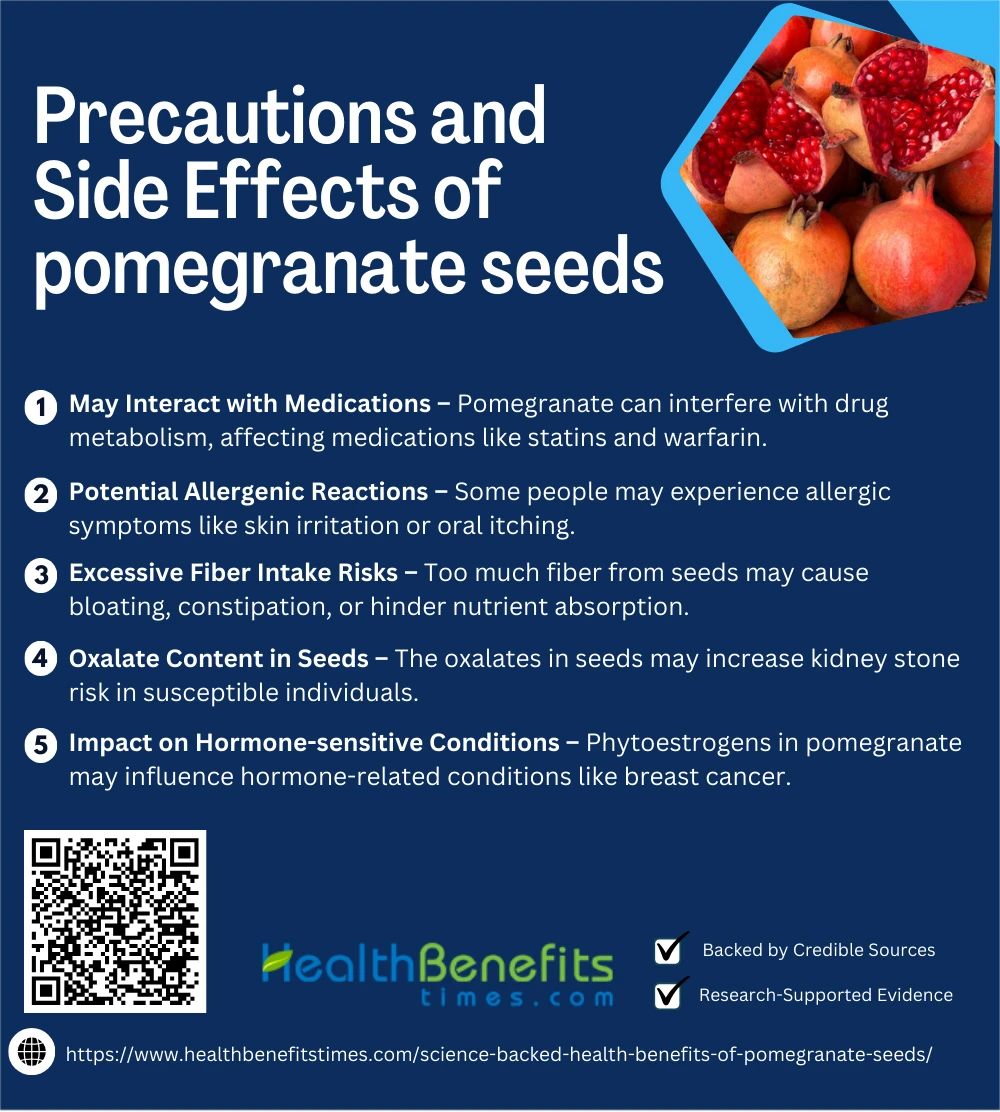 1. May Interact with Medications
1. May Interact with Medications
Pomegranate seeds and juice can interact with medications by inhibiting cytochrome P450 enzymes, particularly CYP3A4 and CYP2C9, which affects drug metabolism. This may alter the pharmacokinetics of medications like warfarin and statins as explained in this research. Pomegranate has shown significant interaction with drug absorption and bioavailability reviewed here. (62) Further evidence highlights potential risks when combined with antihypertensive agents as noted in this comprehensive review. (63)
2. Potential Allergenic Reactions
Though generally safe, pomegranate seeds may cause allergic reactions in sensitive individuals, such as skin irritation or oral itching. A study found immunomodulatory effects in sensitized cell lines when exposed to pomegranate extracts as shown here. (64) Hypersensitivity reactions may also occur due to interactions with fungal allergens discussed in the same publication. (65) These responses suggest caution for those with known fruit allergies or compromised immunity.
3. Excessive Fiber Intake Risks
Pomegranate seeds are rich in dietary fiber, which is beneficial in moderation but may lead to gastrointestinal discomfort if consumed excessively. Overconsumption has been linked to bloating and constipation due to high insoluble fiber as reported in this phytochemical review. (66) In high doses, this can stress the digestive system discussed here. (67) Fiber from such seeds also impacts nutrient absorption and stool consistency outlined in this review. (68)
4. Oxalate Content in Seeds
Pomegranate seeds contain oxalates, which may pose risks for individuals prone to kidney stones. Oxalate-rich foods can contribute to calcium oxalate stone formation as identified here. (69) Studies also show that while pomegranate has protective antioxidant qualities, its oxalate presence requires moderation as noted in this review. (70) Research further confirms its influence on urinary oxalate levels demonstrated here. (71)
5. Impact on Hormone-sensitive Conditions
Pomegranate seeds contain phytoestrogens and ellagitannins that may affect hormone-sensitive conditions such as breast cancer. Studies demonstrate that pomegranate seed oil inhibits estrogen receptor-positive cancer cell proliferation as noted here. (27) Its polyphenols modulate estrogenic activity and offer selective estrogen receptor modulator-like behavior explored in this study. (72) Additionally, its extracts can suppress estrogen-responsive gene expression in breast cancer cells as supported here. (73)
Conclusion
Flaxseeds are a powerhouse of nutrition, offering a wide range of science-backed health benefits. Rich in omega-3 fatty acids, lignans, and fiber, they support heart health, aid digestion, regulate blood sugar levels, and may help reduce the risk of certain cancers. Their anti-inflammatory and antioxidant properties also promote overall wellness and cellular health. Whether added to smoothies, oatmeal, or baked goods, flaxseeds are an easy and versatile addition to a balanced diet. However, moderation is key, and individuals with certain health conditions should consult a healthcare provider before incorporating them regularly. Overall, flaxseeds are a smart choice for long-term health.



